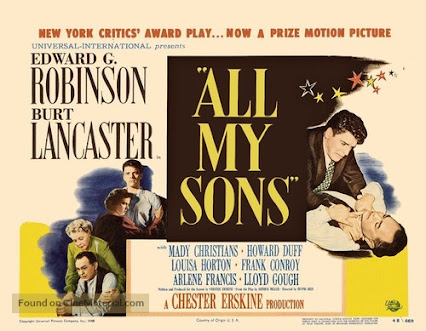Crack-Up (1946) is an American film noir directed by
Irving Reis and starring Pat O’Brien, Claire Trevor, and Herbert Marshall. The
supporting cast includes Ray Collins and Wallace Ford.
Art critic George Steele (O'Brien) remembers surviving a
train wreck that never took place; it's just the first incident in a growing
web of intrigue and murder.
Film critic Leonard Maltin described the film as a “Tense, fast-paced
Hitchcockian thriller with many imaginative touches.
Irving Reis (1906 – 1953) was a radio program
producer and director and a film director. Reis directed several notable and
popular films including Hitler’s Children (1943) The Bachelor and the
Bobby-Soxer (1947) All My Sons (1948).
Pat O’Brien (1899 – 1983) was an American film actor.
O’Brien appeared in more than 100 films, often playing characters of Irish
descent. He played cops, priests, and reporters. He was often paired with friend
and movie star James Cagney. O’Brien is probably best known for his roles in Angels
with Dirty Faces (1938), Knute Rockne, All American (1940), and Some
Like it Hot (1959).
Claire Trevor (1910 - 2000) was an American
actress who appeared in over 60 movies. She received nominations for the
Academy Award for Best Supporting Actress for Dead End (1937),
and The High and the Mighty (1954). She won the award for her
performance in Key Largo (1948). Trevor got her start on the
New York stage and made her film debut in 1933. She also appeared on radio with
Edward G. Robinson in the popular radio program Big Town. Trevor’s
most famous role is probably Dallas in Stagecoach, but she had
other memorable roles in Murder, My Sweet (1944), and Born
to Kill (1947). Her last film role was in Kiss Me Goodbye (1982)
where she played Sally Field’s mother.
Herbert Marshall (1890 – 1966) was an English actor
of stage, screen, and radio. Marshall was a popular leading man during the
1930s and 1940s. He starred opposite Barbara Stanwyck, Greta Garbo, Joan Crawford,
and Bette Davis. Some of his films include Trouble in Paradise (1932), The
Good Fairy (1935), Foreign Correspondence (1940), The Little Foxes
(1941), and The Razor’s Edge (1946).
 |
| Pat O'Brien, Claire Trevor, and Herbert Marshall |
Crack-Up trivia
- Crack-Up was the only film noir from director Irving Reis.
- Laura (1944) and Scarlet Street (1945) also make use of painting and art.
- The film was set in New York City, but several scenes were filmed in Los Angeles harbor.
- Reis directed many of the “Falcon” movies during the early 1940s.
Click HERE to watch the film on YouTube.
Click HERE to join the online discussion on November 18,
2024, at 6:30 p.m. Central Time. Once you RSVP, you will receive an invitation
and a link to join the discussion on Zoom.
Discussion questions
- Did you like the background of the art world?
- Was the story believable? Were you able to just enjoy the ride?
- What did you think of the performances?
- Did O’Brien and Trevor have good on-screen chemistry?
- Were you surprised by anything?




